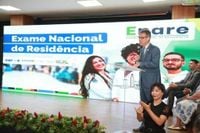On Thursday, April 24, 2025, the Ministry of Education (MEC) in Brazil took a significant step towards enhancing the quality of medical education by publishing two critical measures in the Official Gazette of the Union (DOU). These measures, known as Ordinances MEC Nº 329/2025 and Nº 330/2025, aim to establish a comprehensive framework for evaluating medical training across the country.
At the heart of this initiative is the National Exam for the Evaluation of Medical Education (Enamed), introduced by Ordinance MEC Nº 330/2025. This exam will assess medical students' performance against the National Curriculum Guidelines (DCNs), focusing on essential competencies required for professional practice. Participation in Enamed will be mandatory, with its structure fully integrated into the undergraduate medical curriculum.
The introduction of Enamed is seen as a strategic national move to monitor and improve the quality of medical education in Brazil. Its results will not only be used to evaluate the quality of medical courses nationwide but will also play a pivotal role in the selection processes for medical residency programs, including the National Residency Exam (Enare), which is also established by the same ordinance.
According to Minister of Education Camilo Santana, the primary goal of Enamed is to ensure that medical graduates possess the necessary skills and knowledge outlined in the DCNs. Santana highlighted the importance of forming a working group (GT) to discuss the exam's implementation. This group will consist of members from various councils, professional entities, and public institutions to determine the optimal format for the exam.
"The doctor deals with life. We understand the importance of having qualified healthcare professionals, especially within the SUS (Unified Health System)," Santana stated. "We aim to guarantee the quality of our health professionals, including doctors and nurses. With Enamed, we are making a significant step towards achieving this goal."
Minister of Health Alexandre Padilha also emphasized the need for a humanized approach in training specialists. He noted that the evaluation process should focus on results and the overall training of healthcare professionals, ensuring that they are equipped to meet the needs of the population. Padilha commended Santana for pursuing the best international practices in medical education.
Enrollment for the Enamed exam will be free, with specific criteria and deadlines to be outlined in a notice issued by the National Institute for Educational Studies and Research Anísio Teixeira (INEP). The enrollment period is expected to begin in July 2025, with the exam scheduled for October and individual results to be released in December.
In addition to Enamed, Ordinance Nº 329/2025 addresses the National Residency Exam (Enare), which aims to standardize the selection process for candidates entering medical residency programs. This initiative seeks to democratize access to residency programs, ensuring transparency and fairness in the selection criteria, and providing equal opportunities for all candidates, regardless of their socioeconomic background.
"The Enare will be conducted annually by the Brazilian Company of Hospital Services (Ebserh), with a decentralized application process," Santana explained. The ordinance also includes provisions for affirmative action, allowing for reserved spots based on the criteria established in the Ebserh notice.
On April 23, 2025, the announcement of an Interministerial Commission was made by Ministers Santana and Padilha. This commission will evaluate the quality of medical education in Brazil, focusing on the results from Enamed and the new educational guidelines. Its responsibilities will include analyzing exam results, assessing the quality of medical courses, and updating curricular guidelines to better meet contemporary demands.
One of the commission's key focuses will be to define clear expectations for students at each stage of their education. This initiative aligns with the broader goals of the Mais Médicos Program, which was established in 2013 to improve access to healthcare in vulnerable regions and strengthen Primary Health Care (APS).
The Mais Médicos Program currently employs 24,900 professionals across 4,200 Brazilian cities, covering 77% of the national territory and providing assistance to over 64 million people. The program aims to increase the number of doctors to 28,000 by the end of 2025, reflecting its commitment to enhancing healthcare access and quality.
In conclusion, the introduction of Enamed and the reforms surrounding medical education in Brazil represent a significant shift towards ensuring that future healthcare professionals are well-equipped to meet the challenges of modern medicine. By focusing on standardized evaluations and improving residency selection processes, the Brazilian government aims to elevate the standards of medical training and ultimately improve healthcare outcomes for the population.






